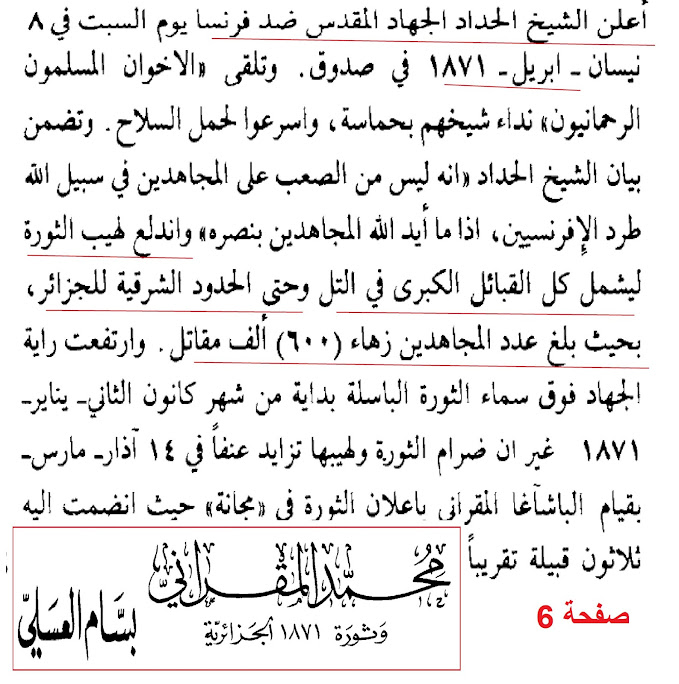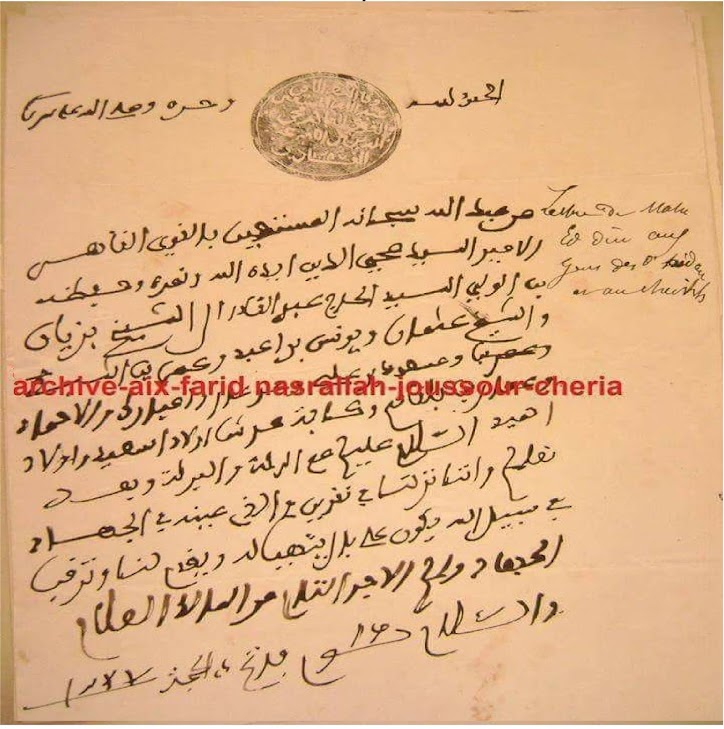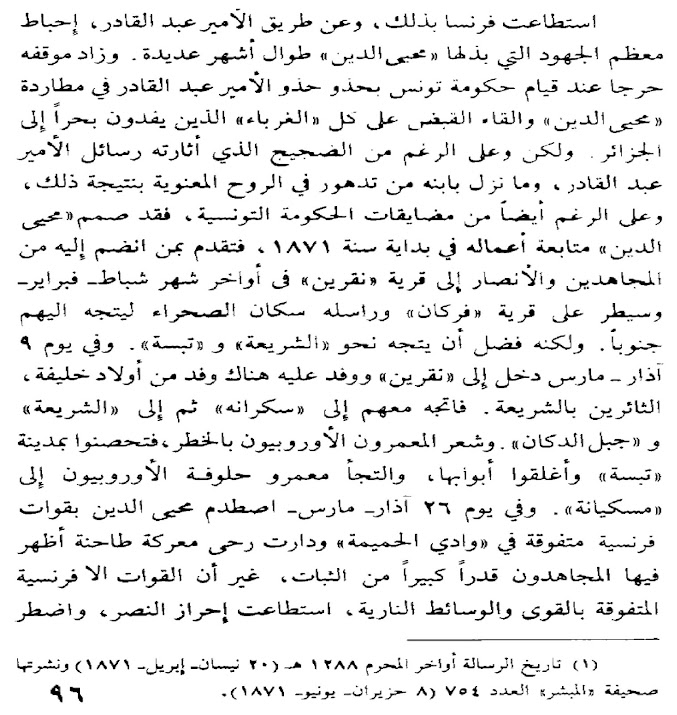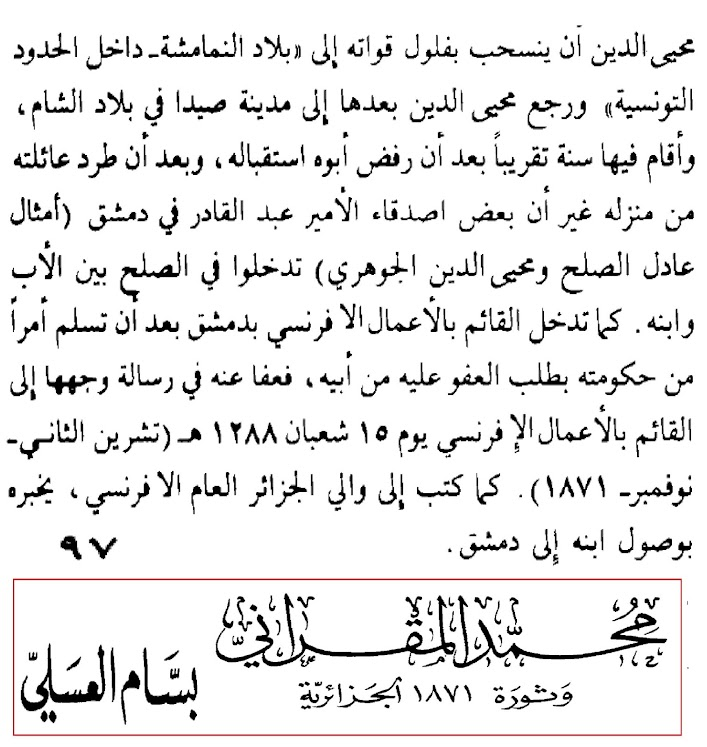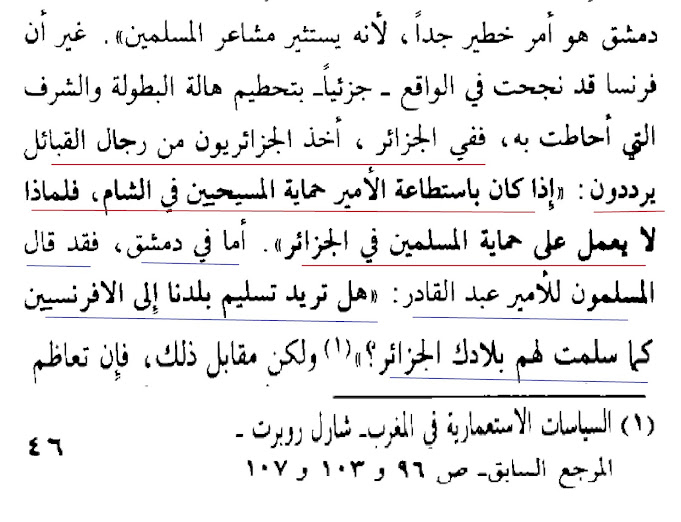Prince Abdul Qadir's position on the 1871 revolution against the French occupation
History is the nation's memory, and the nation's memory is just like the memory of the individual, in which the nation is aware of its past, interprets its present, and anticipates its future. And likewise the nation when its history is lost and it confuses the minds of its children Unfortunately, most of Algeria’s ancient and modern history is distorted and distorted, and most of the historical facts have been deliberately or ignorantly obliterated.
On April 8, 1871 AD, the hero called Sheikh Al-Haddad, from the region of Sadouq, in Bejaia, to a massive revolution against the French to expel them from Algeria completely. The number of revolutionaries is about 200,000 Mujahideen
In the month of January 1871 CE, Sheikh Ahmed Al-Maqrani joined this revolution, who before this date was a pacifist and a leader with the French government, but he turned against it and responded to the call of jihad and sealed his history and biography as a fighter for the sake of God and for the liberation of the country.
In Sahih al-Bukhari from the hadith of Sahl bin Saad, may God be pleased with him, that the Prophet, may God’s prayers and peace be upon him, said: The servant does the work of the people of Hell, and he is one of the people of Paradise, and he does the work of the people of Paradise, and he is one of the people of Hell. Business in the rings. And in a narration by Imam Ahmad in Al-Musnad, which was corrected by Al-Arna’oot: The deeds are only with the last ones. What is meant by deeds is what a person does, whether good or bad. What is meant by the last ones: what he does at the end of his life and at the end of his life.
As for Prince Abdul Qader, it is almost impossible to talk about him in the educational and school curricula in Algeria. He does not go out of his years of life, before his surrender to France. Researchers and the educational system neglect what happened after his surrender to France, especially the period he lived in Syria and his stances on the popular revolutions in Algeria that came after his departure. Especially his position on his son Muhyiddin, who carried out a revolution in 1871 against France. This history is hidden from many people. We will learn about its details in this next research.
During the revolution of 1871 AD, which extended to the eastern border of Algeria, among the heroes who participated in it and called for it was Sheikh Muhyi al-Din, son of Prince Abd al-Qadir ibn Muhi al-Din), who fled from his father, Prince Abd al-Qadir, and left for Egypt and then to Tunisia in order to plan a massive revolution in Algeria against the French occupation
In the year 1287 AH, 1871 AD, a fight took place between France and Germany, and when victory came to Germany in the first months, Sheikh Muhyiddin thought that the war would be prolonged between the two countries, so he took it as an opportunity to rid his homeland of Algeria from France and the oppression of the occupation. He went secretly from his father, Abdel-Qader, with the intention of visiting the Egyptian homeland. From Alexandria, head
to Tunisia
A historical document in which the hero Mohieddine Arash calls for the Namamsha Berbers (Chouis) to join the jihad against France
It stated:
From Abdullah, Glory be to Him, who seeks the help of the powerful and omnipotent, Prince Muhyi al-Din, may God support him, help him and protect him, the son of the guardian, Sayyid Hajj Abdul Qadir, to Sheikh Bouziane, Sheikh Othman, Yunus bin Abdo Amrin ———- and Ammar bin Belvasim and all the thrones of Saedan’s children and children benign
Peace be upon you with mercy and blessings, and after:
We inform you that we came down in Nafrin, and the one who was appointed in the jihad in the way of God is on the mind that prepares for him and presents to us and anticipation of jihad, and they will have the full reward from the righteous owner.
And peace.. on the 16th of Dhul-Hijjah
The hero Mohieddin, and in contrast to the positions of his father, Prince Abdul Qadir, who, after his surrender to France, was not satisfied with surrendering, but became a close friend of the French emperor and his aid in the Levant (Syria). He vowed to them that he would not rebel against the French and would not incite them to fight them, neither he nor his sons for the remainder of his life.
A copy of a letter from Prince Abdul Qadir pledged to the French not to revolt against them again.
Source
Letter to the French , full translation on the original manuscripts by René R. Khawam
René Rizqallah Khawam, Arabic-French translator, was born in Jalb in 1917 and died in France
See message No. 326
Link to view and download in PDF format
Letters of Prince Abdul Qadir with the French occupier
http://journal-smala.org/docs/correspondances_de_fort_lamalgue.pdf
Muhyiddin, son of Prince Abdel Qader, left with his father when he was young, exiled from Algeria to France and then to Syria. He grew up carrying in his heart the love of Algeria and the love of the revolution against the French. And re-revolution against the French occupation, and this is in contrast to his father’s decision to live permanently in Syria and the Levant, and he completely abandoned the idea of returning to Algeria. Ibn al-Amir Abd al-Qadir, around the year 1870 AD, wrote to many Algerian leaders, urging them to prepare for jihad against France, and calling them to arrange supplies and ammunition and to recruit people.
As these moves were made by Muhyi al-Din without the knowledge of his father, Prince Abdul Qadir, and violated the covenant made by his father Abdul Qadir to France that he and his family and children would not revolt against it and did not incite the Algerians to fight against it.
But Muhyiddin, the son of Prince Abdul Qadir, violated his father’s covenant and moved from Syria to Egypt on the pretext of medical treatment there and sought knowledge to hide the matter from his father. From Egypt, he moved to Tunisia (the Algerian border) and began to meet with the leaders of the Algerian tribes in the Algerian east to plan a massive revolution against the French
While the hero Muhyiddin was carrying out this revolutionary activity on the Algerian border, France noticed him and sent to his father, Prince Abdul Qadir, through the French consulate in Syria, to inform him of Muhyiddin's anti-French movements and to ask him to stop his son and stop his movements and denounce them.
Prince Abdul Qadir quickly responded to the demands of the French and announced his denunciation of the actions of his son Muhyiddin. Rather, he declared his disavowal of him and his actions and renewed his promise to France and its king
Where Prince Abdul Qadir edited several letters in which he denounced the movements of his son Muhyi al-Din and those with him from the revolutionaries, and among the letters he sent to the French, we find a letter he sent to the French Consul in Damascus, Syria, in which he stated: And he made an appeal to the Algerian population to revolt against France in order to realize the claim that I am innocent of him and what he did.
See the same previous reference
It was recorded for us that Prince Abdul Qadir turned from one extreme to the opposite of the great mujahid who fought France to the last minute and then turned after his surrender to the loyal friend of France and to the king and showed cooperation with the French government in extending its policy in the countries of the East, which was based on a French-English project. It aims to establish a great Arab empire to succeed the Ottoman Empire in the countries of the East, a plan whose goal was to eliminate the Ottoman influence in the Levant and North Africa and to eliminate and dwarf the Ottoman Empire
The strange thing is that the French and the Europeans were suggesting that this great Arab empire would be led by Prince Abdul Qadir Al-Jazaery, especially after his position in the events of the conflict in Syria and his protection of Christians from killing.
After the revolutions of 1871 AD, called for by Sheikh Al-Haddad and joined by Sheikh Ahmed Al-Maqrani, and included all the Algerian east in the countries of the great Kabyles and in the countries of Al-Namamsha and even the borders of the eastern desert,
France was able, through Prince Abdul Qader, to champion most of the efforts made by the hero Muhyiddin and increased in The matter is worse, when the Tunisian government, by order of France, chased Muhyi al-Din and his followers who fled to al-Namamsha in Tunisia. Despite that, Muhi al-Din insisted on jihad and fighting France, and they decided to enter Algeria in the region of Tebessa and began in the Great Revolution of 1871 AD.
Glory be to God who creates the living from the dead and creates the dead from the living as it came in the book of God Almighty in the form of the Romans
He brings the living out of the dead, and He brings the dead out of the living, and He revives the earth after its death.
This verse is the best expression of the relationship between the stance of the hero Muhyiddin, who rose to fight France and saluted the spirit of jihad and the defense of Algeria, and Prince Abdul Qadir’s loss of all sense of jihad for the sake of God and for the liberation of Algeria, and he became like the dead from whom the neighborhood came out.
Yes, dear reader, even Prince Abdul Qadir in a letter to the French when he was detained with his family in a castle in France before his deportation to the East described himself as a dead being and considered himself among the dead and only thought of going to live in Mecca or Medina
See the letter of Emir Abdelkader to the French Provisional Government No. 327
Muhyi al-Din Ibn al-Amir Abd al-Qadir entered the vicinity of al-Namamsha and, with the thrones and the tribes, carried out a large armed revolution that ended with his withdrawal to the Tunisian borders, due to the lack of equal equipment and strength with the French enemy.
During this revolution, Muhyiddin was subjected to great pressure exerted by his father, Prince Abdul Qadir, in order to demoralize his son and those with him from the revolutionaries and push them to stop the revolution and submit to France.
After the failure of the revolution, Muhyi al-Din ended up returning to Syria, where he moved to the city of Sidon and lived there for a year because his father, Prince Abdul Qadir, had acquitted him and did not want to receive him.
In the end, some relatives and friends intervened and mediated between the son and his father
In the end, we say, may God have mercy on the hero, Muhyi al-Din, the son of Prince Abdul Qadir, and he believed in his saying, the Most High (He brings the living out of the dead, and brings the dead out of the living, and revives the earth after its death, and so do you).
Prince Abdelkader, after his surrender and emigration to Syria, announced his rejection of the revolution of the Algerians in the Kabylie region in 1872 AD against the French, where he said that he denounced this revolution and that it was against justice and against the will and will of God and said that he prayed to God to punish traitors and fail the enemies of France
“I denounce this insurrection against justice, against the will of God and mine. We pray to the Almighty to punish the traitors and confound the enemies of France”.
French historian Charles Andre Julien also writes: "Emir Abdelkader's appeals to Kabylie to lay down their arms, had no effect on the combatants, to whose feelings he was a stranger".
Book by Charles André Julien.
Title: History of contemporary Algeria 1827-1871.
Paris, PUF. 2nd edition 1979.
Page 209.
Picture from the book Yes, dear reader, this is the history hidden from you
As for Prince Abd al-Qadir, he was subjected to a wave of anger and anger from the residents of Damascus and Syria, and from the inhabitants of Algeria. The Algerians are at home. If the emir is able to protect the Christians in the Levant, why does he not work to protect the Muslims in Algeria?
As for the people of Damascus, some of them said to Prince Abdul Qadir: “Do you want to hand our country over to the French as you
?”handed over to them your country Algeria
As for France, whose friend Prince Abdelkader became its friend, I honored him by constructing a monument to commemorate his stances and cooperation with it in the East and the Islamic Maghreb. As he became a loyal friend of France, a monument was inaugurated in the city of Mascara in 1949 in memory of Prince Abdelkader, friend of France, as he was called by the authorities. In the presence of some of the sons and grandsons of Emir Abdelkader, the ruler of Algeria, some French generals, and the traitorous Arab morning band, while the hero Mohieddin and his sons did not attend.
In the end, we say, O God, forgive Prince Abdul Qadir his sins and forgive his sins, for we are all wrong, and you are the most merciful of the merciful.
https://amazighrevolutions.blogspot.com/2020/04/1871.html



